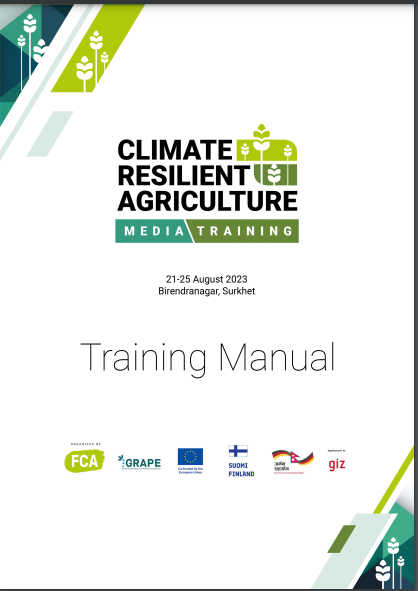In a bid to strengthen the capacities of journalist in understanding on climate resilient agriculture and help media identify challenges and good practices of farmers in CRA, Freedom Forum designed and delivered the five-day residential CRA Media Training cum Fellowship program for mid-career working journalists. As part of the GRAPE Project, FCA organized the program for journalists from seven districts of Karnali and Sudurpaschim provinces in Karnaali province headquarters, Surkhet, on 21-25 August 2023. A total of 32 journalists from Dailekh, Surkhet, Humla, Kailali, Dadeldhura, Bajura and Doti districts had participated in the training aiming at raising an understanding and awareness about the climate-resilient agriculture. Besides, the thrust of the training was to help them in developing media content (news, stories, features) in the theme of CRA.
The training program mainly included three domain of works – developing a manual for CRA media training, facilitating training sessions and providing inputs in selecting fellows based on their training performance. The major areas covered in the training manual and training delivery were fundamentals of climate change and climate resilient agriculture, CRA and journalism, field reporting of CRA and feedbacks and digital story telling on CRA.
 A 52-page CRA media training manual covered weather change, climate change, differences between weather change and climate change, subsistence and modern agriculture, Green House Gas emission in Nepal, rise in temperature and global warming, Nepal in risk cycle, climate change effects in agriculture and food security, climate change risk mapping and reporting, interaction with CRA specialists, climate change adaptation and mitigation strategies for CRA, hard news, soft news and feature stories on CRA and it story-telling through different varieties.
A 52-page CRA media training manual covered weather change, climate change, differences between weather change and climate change, subsistence and modern agriculture, Green House Gas emission in Nepal, rise in temperature and global warming, Nepal in risk cycle, climate change effects in agriculture and food security, climate change risk mapping and reporting, interaction with CRA specialists, climate change adaptation and mitigation strategies for CRA, hard news, soft news and feature stories on CRA and it story-telling through different varieties.
The training was divided into five modules and 22 sessions spanning five days. Roughly 60 minutes were allocated for the presentation and illustrations and 30 minutes for journalistic exercise.
The training was focused on developing understanding Climate Change and CRA; linking CRA and Journalism, field visit for CRA reporting and news writing, writing CRA stories in different formats and CRA story-telling and fellowship.
The Climate Change Resilience (CRA) training session was a significant milestone for both participants and organizers. First and foremost, it’s important to note that this training marked the inaugural exposure to CRA for all the participants. This fact alone highlights the importance of creating opportunities for individuals to enhance their understanding of climate change resilience, an area of critical importance in today’s world. The outcomes of the training were nothing short of remarkable, with participants and organizers alike expressing their unanimous agreement that the training was immensely valuable, highly effective, and eminently practical. For the participants, many of whom were seasoned journalists, this training was an eye-opener. They discovered the significance of reporting on CRA, a topic that had not received the attention it deserved in their previous work. The training allowed them to connect the dots between their existing journalism efforts and the broader context of climate change resilience. It served as a revelation, illuminating how their work, even if indirectly, was already intertwined with the overarching theme of climate change resilience.
A substantial number of participants shared their experiences of reporting on climate change and its far-reaching impacts on agriculture and the livelihoods of people. These journalists had been covering stories about changing weather patterns, shifting agricultural practices, and the struggle of communities to adapt to these changes. However, what they hadn’t fully realized before the training was the depth and breadth of the CRA framework and how it provided a comprehensive approach to address these issues. The training content, which ranged from the basics of climate change to the intricate linkages between journalism and CRA, was instrumental in bridging the knowledge gap. Participants found it not only enlightening but also incredibly practical. They appreciated that the training didn’t just delve into theoretical concepts but provided actionable insights that could be immediately applied to their journalism practices.
One key takeaway from the training was the importance of effective communication. Journalists play a pivotal role in disseminating information about climate change and resilience to the broader public. Through compelling storytelling and accurate reporting, they can raise awareness and drive positive change. Many participants remarked that the training had sharpened their skills in conveying complex climate related information in a clear, accessible, and engaging manner. Moreover, the training encouraged participants to view their role as not just reporters but as catalysts for change. They realized that their stories could inspire action and policy shifts at local, regional, and even national levels. This newfound perspective invigorated their commitment to their craft and their mission as journalists. The holistic approach of the training also left a profound impact. It emphasized the interconnectedness of various aspects of climate change resilience, such as community engagement, sustainable agriculture, and disaster preparedness. Participants grasped the significance of addressing these issues comprehensively, 17 rather than in isolation. They saw how their reporting could contribute to a more resilient and sustainable future.
In conclusion, the CRA training was a pivotal experience for both participants and organizers. It served as a catalyst for change, empowering journalists to play a more active and informed role in the discourse on climate change resilience. As a specialist in this field, I’m heartened by the positive feedback and the newfound enthusiasm of these journalists to make a difference. It’s clear that the training has set them on a path to becoming even more effective advocates for climate change resilience, armed with the knowledge and skills to drive meaningful change through their reporting.

